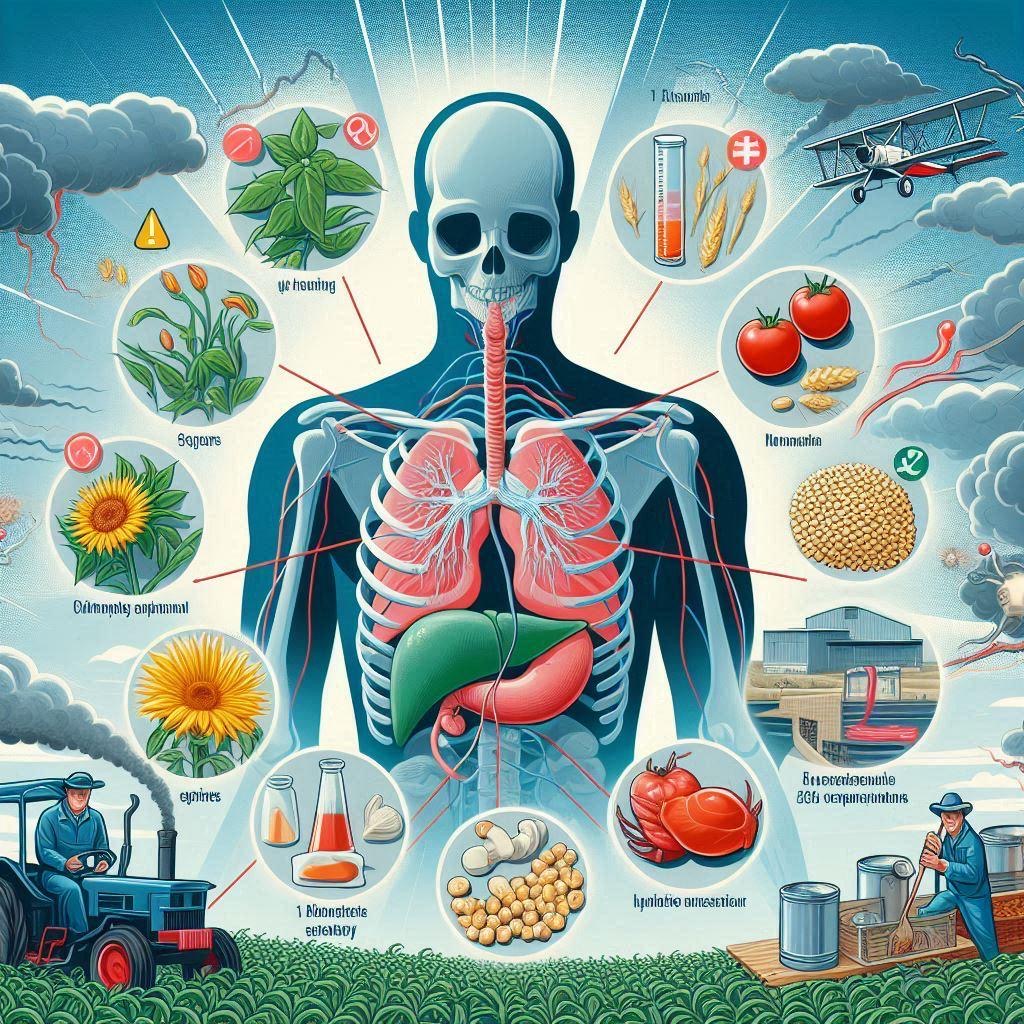Your cart is currently empty!

Pesticide Exposure: The Health Implications, not just for Farmers!
Pesticides, designed to eliminate pests, can have negative impacts on human health. Let’s explore the risks associated with these toxic substances:
Acute Pesticide Poisoning
- Occurs when direct exposure to pesticides leads to an adverse reaction within 48 hours.
- Symptoms range from mild discomfort to lethal effects:
- Headache
- Allergic sensitization
- Eye and skin irritation
- Sore throat and cough
- Diarrhea
- Nausea and vomiting
- Loss of consciousness
- Extreme weakness
- Seizures
- Death¹.
Global Impact:
- Over 385 million people suffer from unintentional pesticide poisoning annually, resulting in approximately 11,000 deaths.
- Tragically, ingesting pesticides is one of the most common methods of suicide worldwide, claiming a life every three minutes¹.
Routes of Exposure:
- Ingestion: Pesticides can be present on food and in drinking water.
- Inhalation: Breathing in pesticides near sprayed areas.
- Dermal: Absorption through skin or eyes, common for those working with pesticides¹.
Long-Term Health Effects:
- Parkinson’s disease, thyroid disease, diabetes, kidney diseases, and rheumatoid arthritis are linked to pesticide exposure.
- Children are particularly susceptible to adverse effects, including neurodevelopmental issues².
Other Health Risks:
- Pesticides are associated with:
- Cancer
- Alzheimer’s disease
- ADHD
- Birth defects
- Harm to the nervous, reproductive, and endocrine systems³.
Food Residues:
- Invisible pesticide residues exist on fruits, vegetables, and grains (such as oats, wheat, and barley).
- Adverse effects occur above a certain safe level of exposure, including cancer and effects on reproduction⁵.
In the agricultural industry, glyphosate, known by its commercial name Roundup, is a ubiquitous presence. It’s hailed for its effectiveness in weed control, but its widespread use raises concerns about the health implications for those who handle it regularly, particularly farmers. This blog post examines the health effects associated with glyphosate exposure, drawing on recent studies and findings.
Oxidative Stress and Respiratory Issues
A study among maize farmers in Northern Thailand revealed that exposure to glyphosate during its application significantly affected oxidative stress levels and lung function¹. The farmers exhibited increased serum malondialdehyde (MDA), indicating heightened oxidative stress, and decreased glutathione (GHS), an essential antioxidant. Moreover, their lung function showed a decline, with measurements such as forced expiratory volume (FEV1) and peak expiratory flow (PEF) decreasing after glyphosate application¹.
Carcinogenic Concerns
The potential carcinogenicity of glyphosate has been a subject of intense debate. The International Agency for Research on Cancer (IARC) classified glyphosate as “probably carcinogenic to humans,” based on evidence from human exposure and animal studies². This classification has fueled discussions about the safety of glyphosate, especially for farmers who are in direct contact with the herbicide.
Dermatological and Ocular Effects
Farmers exposed to glyphosate have reported dermatological and ocular effects, which include skin irritation and eye discomfort. These symptoms are concerning as they suggest that glyphosate can have immediate adverse effects on those who come into contact with it³.
Reproductive and Developmental Health
There is also evidence to suggest that glyphosate exposure may have reproductive and developmental health implications. Studies have found associations between exposure and various reproductive issues, although the exact nature of these relationships requires further research³.
Acute Myeloid Leukemia
The Agricultural Health Study (AHS) has indicated a suggestive link between high lifetime use of glyphosate and an increased risk of acute myeloid leukemia. While the study did not find a connection with other cancers, this potential association is particularly concerning for farmers with prolonged exposure to the herbicide.
Conclusion
The health risks associated with glyphosate exposure for farmers are multifaceted and deeply concerning. From oxidative stress and respiratory problems to potential carcinogenic effects and reproductive issues, the evidence points to a need for caution and further investigation. As the agricultural sector continues to rely on glyphosate for weed control, it is imperative to balance the benefits with the health of those most at risk—farmers. Ensuring their safety and well-being should be a priority, alongside the pursuit of sustainable and less harmful agricultural practices. In summary, while pesticides serve essential purposes, their potential harm underscores the need for caution and informed choices.
(1) Are pesticides harmful to humans? | Patient. https://patient.info/news-and-features/are-pesticides-harmful-to-humans.
(2) National Institute of Environmental Health Sciences: Pesticides. https://www.niehs.nih.gov/health/topics/agents/pesticides.
(3) The Dangers of Pesticides | Green Science – Nature. https://www.nature.com/scitable/blog/green-science/the_dangers_of_pesticides/.
(4) Pesticide residues in food – World Health Organization (WHO). https://www.who.int/news-room/fact-sheets/detail/pesticide-residues-in-food.
(5) Health effects of pesticides – Wikipedia. https://en.wikipedia.org/wiki/Health_effects_of_pesticides.
Updated 5/18/24
(1) Effects of exposure to glyphosate on oxidative … – BMC Public Health. https://bmcpublichealth.biomedcentral.com/articles/10.1186/s12889-022-13696-7.
(2) Concerns over use of glyphosate-based herbicides … – Environmental Health. https://ehjournal.biomedcentral.com/articles/10.1186/s12940-016-0117-0.
(3) ATSDR Glyophosate ToxGuide – Agency for Toxic Substances and Disease …. https://www.atsdr.cdc.gov/toxguides/toxguide-214.pdf.
(4) Glyphosate: A review of its global use, environmental impact, and …. http://hh-ra.org/wp-content/uploads/Richmond_glyphosate_2018.pdf.
Discover more from The Truth About Food
Subscribe to get the latest posts sent to your email.

